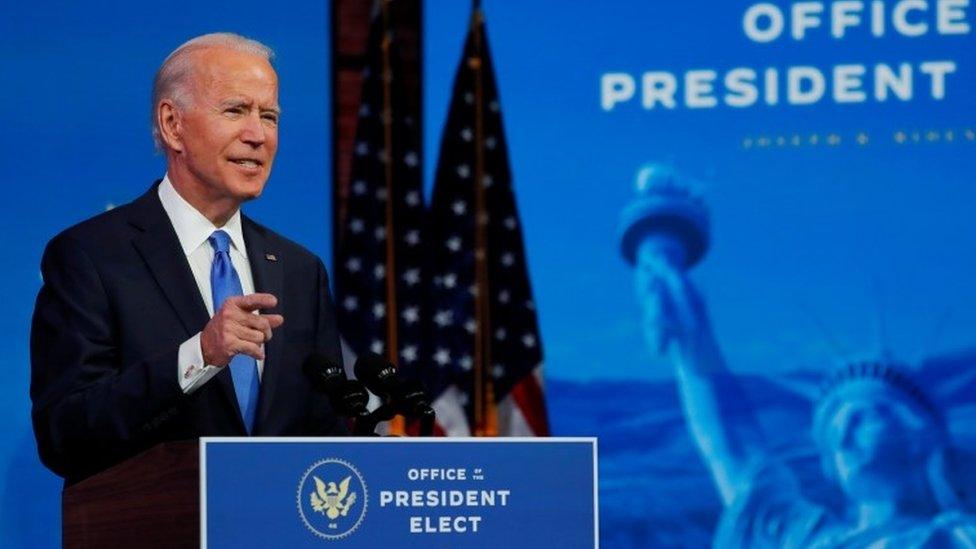Can rebel Republicans overturn the election?
- Published
How an election is supposed to be certified by Congress
Election Day may feel like an era ago but the presidential saga isn't over yet. Now it's time for Congress to take centre stage - and there's already political drama aplenty.
Americans cast their ballots on 3 November, setting in motion the electoral proceedings that led to Democrat Joe Biden becoming the US President-elect.
But the presidential cycle is not done and dusted until Congress approves the Electoral College results and Mr Biden takes his oath of office on 20 January.
From constitutional deadlines to congressional objections, there's a lot to explain.
First things first...
What are electoral votes?
When Americans go to the polls in presidential elections they're actually voting for a group of officials who make up the electoral college.
The word "college" here simply refers to a group of people with a shared task. These people are electors and their job is to choose the president and vice-president, based on the popular vote of their states.
There are 538 electors in total, divvyed up among the states. Each elector represents one electoral vote, and a candidate needs to gain a majority of the votes - 270 or more - to win the presidency.
In this election, President-elect Joe Biden defeated President Donald Trump by 306-232. He also won the popular vote by more than seven million ballots.

Vice-President Mike Pence will preside over the count
The electoral college meets every four years, a few weeks after election day, to cast their electoral votes.
What's Congress got to do with it?
Congress will finalise the results of the 2020 election by certifying the electoral college votes. It's a part of the process enshrined in the Constitution.
All 50 states have certified the election result, some after recounts and legal appeals.
On 14 December, members of the electoral college sent off their votes in sealed certificates to Congress from across the country.
On 6 January, these certificates will enter the Capitol in mahogany ballot boxes.
Members of both the House of Representatives and Senate from both parties will read the votes out in alphabetical state order and tally them up.
Vice-president Mike Pence, who is the president of the Senate, will preside and eventually declare the winner.
Senator Ted Cruz on Donald Trump: then and now
His role as president of the Senate is to "open all the certificates" in the presence of the House of Representatives and the Senate, according to the US Constitution.
OK, so once he does that, Biden is winner and we all go home?
Not this year. Keep reading.
Will results be contested at this point?
Taking their cue from the outgoing president, several lawmakers have said they will raise objections.
This is against the advice of Senate leader Mitch McConnell.
An objection will be heard only if a member of the House and Senate both submit it. Then, the two chambers are allocated two hours per objection to debate the matter before voting on whether to uphold it or not.
For a state's electoral votes to be tossed out, majorities in both the House and Senate must vote to do so. With the House in Democratic control and the Senate with Republicans, this would be all but impossible to pull off.
While there is certainly precedent for post-election pushback, and objections have been recorded before (most recently in 2005), no debate has ever resulted in electoral votes being thrown out.
Why are some Republicans doing this?

It's not exactly Donald Trump's last stand - he may never stop questioning the validity of the 2020 presidential election - but the congressional counting of Electoral College votes is the last major procedural hurdle between Joe Biden and his inauguration.
It is a hurdle Biden, with help of Democrats and some Republicans, is sure to clear.
It is also the last chance for the president's supporters in Congress to demonstrate fealty to their man while he still holds office.
As such, the day's (and night's, and perhaps next morning's) events could shed light on the breadth of support the president still enjoys.
Already, there are signs that his backing may not be as strong as even recent predictions suggested.
If Republicans fall short of 100 votes in the House and the Senate can't muster much more than the dozen senators who have already announced their intention to object, it could indicate a party sharply divided over its future. Does it involve unquestioning loyalty to Trump or one where his power is receding?
No matter the outcome, that such a remarkable, unprecedented attempt to reject the results of a democratic election could become a political litmus test will not easily be forgotten by many.

What are the Republican objections?
Eleven Republican senators, led by Texas Senator Ted Cruz, want a 10-day delay to audit unsubstantiated allegations of election fraud.
In a statement, they said November's election had "featured unprecedented allegations of voter fraud, violations and lax enforcement of election law, and other voting irregularities".
Can you explain the electoral college in 10 seconds?
There is no proof of widespread voter fraud and numerous legal challenges have been tossed out in the courts. An investigation by the federal Department of Justice (DOJ) found no evidence to back any claims of fraud.
The lawmakers said they did not want to "thwart the democratic process" but prove that the election was "lawfully conducted".
Separately, Missouri Senator Josh Hawley has also announced he will object when Congress counts the votes.
In the House, Alabama Congressman Mo Brooks heads the group of dozens of Trump loyalists disputing Mr Biden's win in certain states.
The representatives are objecting to results in the six key swing states won by Mr Biden where the president has challenged the results (Arizona, Georgia, Michigan, Pennsylvania, Wisconsin and Nevada). They argue that these states may not have followed election laws properly.
The vote row has also prompted questions over Vice-President Mike Pence's role as the one presiding over the joint meeting of Congress.
Mr Pence has said he "welcomes" the lawmakers' objections. But by US election law, Mr Pence's duty is purely administrative - and it is highly unlikely he will try to overstep.
Related topics
- Published4 January 2021

- Published15 December 2020

- Published5 January 2021

- Published1 January 2021
